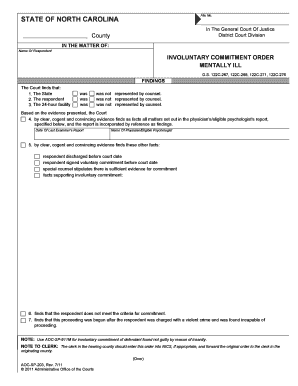Loading

Get Criteria For Involuntary Commitment - Sog Unc
How it works
-
Open form follow the instructions
-
Easily sign the form with your finger
-
Send filled & signed form or save
How to fill out the Criteria For Involuntary Commitment - Sog Unc online
This guide provides step-by-step instructions for effectively completing the Criteria For Involuntary Commitment - Sog Unc form online. By following these instructions, users can navigate the process with clarity and confidence.
Follow the steps to fill out the criteria form accurately.
- Click ‘Get Form’ button to obtain the form and open it in your chosen online editor.
- Begin by filling in the basic information section, which includes the respondent's name and the case file number. Ensure accuracy as this information is critical for identification.
- Next, provide details about the respondent's mental health status. Indicate whether the individual is experiencing a mental illness, substance abuse issues, or any other related conditions.
- Complete the findings section, where you will need to specify if the respondent was represented by counsel during the proceedings.
- In the conclusions section, state whether the court finds the respondent mentally ill or a substance abuser and their level of danger to self or others, using the appropriate checkboxes.
- For the order section, specify the recommendations for treatment, including inpatient or outpatient commitments, and ensure the time periods are noted correctly.
- Finally, review all entries for accuracy and completeness. Once satisfied, save your changes, download the completed form, print it if necessary, or share it as required.
Complete your document online today to ensure a smooth involuntary commitment process.
The Baker Act is a Florida law that allows individuals who are experiencing crippling mental illness to be involuntarily committed for examination and treatment. The Marchman Act is also a Florida law but is invoked for individuals who are deeply impaired by a substance use disorder.
Industry-leading security and compliance
US Legal Forms protects your data by complying with industry-specific security standards.
-
In businnes since 199725+ years providing professional legal documents.
-
Accredited businessGuarantees that a business meets BBB accreditation standards in the US and Canada.
-
Secured by BraintreeValidated Level 1 PCI DSS compliant payment gateway that accepts most major credit and debit card brands from across the globe.


